In this installment of the Living a Full Life series, guest editor Jame Abraham, MD, interviewed Clifford A. Hudis, MD, FACP, FASCO, ASCO’s Chief Executive Officer. Prior to his current position, Dr. Hudis served in a variety of roles at ASCO, including President during ASCO’s 50th anniversary year.
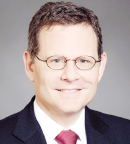
Clifford A. Hudis, MD, FACP, FASCO
Dr. Hudis was born and reared in the middle-class bastion of Northeast Philadelphia during the late 1950s, a time when the national ethos was centered on unlimited possibilities. “In some way, the trajectory of my career reflects the promise and potential of 20th century America. I went to public school in Philadelphia during the Cold War, when we were in a scientific struggle with the U.S.S.R. I remember there was an emphasis on math and science, which created an intellectual atmosphere that would later help my path into medicine,” said Dr. Hudis.
He continued: “I graduated high school from a Quaker institution. My parents saw some particular opportunities for me in that system and took out a loan to send me there. The Quaker schooling had a tremendous focus on values, particularly personal responsibility and honesty, no matter what circumstances you faced.”
CLIFFORD A. HUDIS, MD, FACP, FASCO
On Appeal of MSK: “The Brian Piccolo story [running back for the Chicago Bears who died of cancer at age 26] told of his treatment at MSK, and the Center’s quality impressed my young mind so much that when I moved to New York, I applied for a fellowship there.”
Lasting Piece of Advice: “You’re only as valuable to your institution as it thinks you are to others. It’s important to network and think outside of the four walls of your institution.”
On Physician Burnout: “It’s important for busy oncologists to step back and truly realize that they are part of a scientific-based field that is changing people’s lives around the globe for the better. In and of itself, this can help reduce the emotional stressors that may lead to burnout.”
Medical School
AFTER GRADUATING high school, Dr. Hudis completed his undergraduate studies at Lehigh University as part of an accelerated BA-MD combined program. “My parents were thrilled, partly because they saw the combined program as a savings: Instead of 4 years of college, there would only be 2. So, I did 2 years of undergrad work and transitioned directly into medical school.”
Dr. Hudis attended the Medical College of Pennsylvania, which was founded in 1850 as the Women’s Medical College of Pennsylvania and celebrated as the second medical institution in the world where women could earn a medical degree."
"The school opened its doors to men in the late 1960s and was renamed the Medical College of Pennsylvania. “This institution was responsible, in a practical sense, for educating a large number of American female physicians in the 20th century and before. It offered me an opportunity to be educated in an egalitarian environment. I didn’t think about that aspect while there, but the experience would later come to life when I saw what the rest of medicine in the 1980s looked like,” said Dr. Hudis."
Inspired by Unlimited Future
DR. ABRAHAM asked Dr. Hudis whether there were any seminal experiences or persons who influenced his decision to pursue a career in oncology.
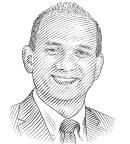
Jame Abraham, MD, FACP
He responded, “During my medical residency, I explored a wide range of career options. However, the oncology clinic caught my attention because the patient population largely came from disadvantaged circumstances, and I observed how connected and engaged the doctor-patient relationships were. And two wonderful mentors Drs. Roz Joseph and Manny Besa ran the oncology clinic. Ironically, it was a place of joy and happiness, whereas my preconceived notion about a cancer clinic was proven wrong.”
Dr. Hudis noted another seminal event in his journey. “I was assigned to prepare a summary of the systemic treatment options available to patients with cancer. In the early 1980s, there were few endocrine treatments and chemotherapies, and it became obvious to me that the future in oncology was virtually unlimited. And I wanted to be part of it.”
GUEST EDITOR
Dr. Abraham is the Director of the Breast Oncology Program at Taussig Cancer Institute, and Professor of Medicine, Lerner College of Medicine, Cleveland Clinic.
He added: “I also found great satisfaction and pleasure in dealing with patients and their families, giving them sound data and realistic hope.”
Destined for Memorial Sloan Kettering Cancer Center
AS A YOUNG boy, Dr. Hudis recalled learning the story of Brian Piccolo, a running back for the Chicago Bears who was treated at Memorial Sloan Kettering Cancer Center (MSK) for a germ cell tumor. “The Brian Piccolo story told of his treat ment at MSK, and the Center’s quality impressed my young mind so much that when I moved to New York, I applied for a fellowship there. During my interview with George Bosl, MD, I told him that if he didn’t hire me as a fellow, I had no idea what I’d do since my heart was set on becoming an oncologist and training at MSK.”
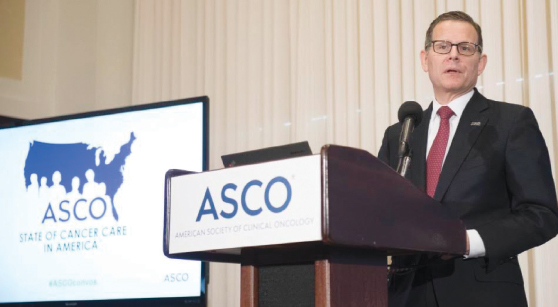
ASCO Chief Executive Officer Clifford A. Hudis, MD, FACP, FASCO
In the first 6 months of his fellowship in 1988, MSK hired Larry Norton, MD, to develop and run the breast cancer program. “I was the second fellow in Larry’s newly established clinic. We found that we had lots of shared interests, and he became a lifelong mentor for me.”
Advice to Young Doctors
ONCOLOGY’S FUTURE advances rely on a steady stream of enthusiastic doctors willing to commit to the rigors of this demanding discipline. To that end, Dr. Abraham asked Dr. Hudis what advice he would give to young doctors beginning a career in oncology.
Dr. Hudis noted that he, like many aspiring doctors, grew up in a middle-class setting where hard work and parsimony were the engrained ethos. But he stressed that money should never be an endpoint in the decision to pursue a career in medicine. “I’ve worked since I was 14 because I had to pay bills, from car payments to rent. There was no financial comfort zone in my life, but there was satisfaction in striving for a goal. When I got into medicine, I always thought about what it meant to be a doctor and never put money into the equation,” Dr. Hudis explained.
“I found great value in dealing with patients and their families, giving them sound data and realistic hope.”— Clifford A. Hudis, MD, FACP, FASCO
Tweet this quote
He continued: “The advice I always give young people is to find something you’re passionate about and pursue it. No doubt, there are challenges in our system, but if you truly believe in your path, things will work out in the end. The key to success is passion and commitment.”
From MSK to ASCO
DR. HUDIS served as Chief of Breast Medicine at MSK for 18 years before becoming the Chief Executive Officer of ASCO. Dr. Hudis recalled, “During my career, I got a lasting piece of advice: You’re only as valuable to your institution as it thinks you are to others. It’s important to network and think outside of the four walls of your institution. I recently visited the Mayo Clinic in Scottsdale, Arizona, and shared that advice with the fellows.”
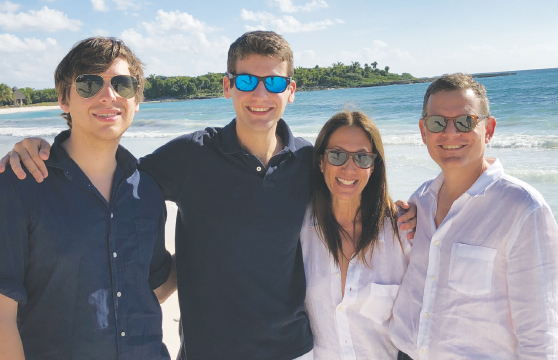
From right to left: Dr. Hudis, his wife Jane, Isaac, and Sam, wearing SPF 30 and enjoying some time off.
As a young doctor, Dr. Hudis became involved with the cooperative groups, particularly the Cancer and Leukemia Group B. He also was involved with the National Cancer Institute. When the National Comprehensive Cancer Network® (NCCN®) was founded, he was on the early breast cancer committee. And finally, he worked with the American Association of Cancer Research and ASCO, both of which offered networking opportunities. “I had the advantage of being a natural joiner,” quipped Dr. Hudis. “I was the type of kid who signed up to lead the campus tours.”
As he entered the second half of his career, Dr. Hudis was deeply involved with ASCO, serving on various committees and eventually being Treasurer of ASCO’s Board of Directors. “Being Treasurer, I found myself exposed to the operational and financial underpinnings of the Society. After my term expired, I was fortunate to win election as ASCO’s President during its historic 50th anniversary. My presidential address focused on bridging the scientific domains back to the broader Society, because there were certain examples where it felt like the public was drifting away from evidence and science. I believed there was an opportunity for the oncology community to take the lead in restoring the public’s faith in science.”
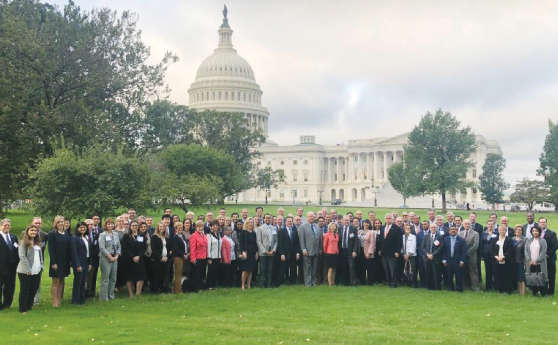
Dr. Hudis joins ASCO volunteers on Capitol Hill advocating for research funding, practice support, and patient access in 2018.
Dr. Hudis stressed that for many patients who first visit an oncologist, it is their initial encounter with hard science translated into treatment. In the oncology clinic, they see that laboratory studies of genomics and molecular biology lead directly to the care they are to receive. “It is critical that we remember that,” he commented. “My theme, Science and Society, was aimed at presenting this opportunity and responsibility to the ASCO membership. We are the ambassadors for the good that science can do, even when imperfect. We demonstrate the vital and practical importance of funding research.”
Sweeping Career Change
DR. HUDIS CONTINUED: “When my predecessor, Dr. Allen Lichter, decided to step down from his post as Chief Executive Officer, I pondered taking up the reins, realizing it would be a profound career change. Our charter requires the Chief Executive Officer of ASCO to be a physician, whereas many organizations do not. I’m very glad that I accepted this challenging job. At the beginning, it was a real learning process because so many of the management and leadership duties are not taught in a conventional medical education.”
Dr. Hudis divides his time between his home in New York and suburban Washington, DC, where ASCO has its headquarters. His duties are multifocal, and his travel requirements are a scheduling challenge. Dr. Hudis is an oncologist by trade and so maintains a small breast cancer clinic in New York, where he sees patients on some Friday afternoons—when he can.
“My patients are, for the most part, low-risk women who are on endocrine therapy. I occasionally see a new patient who fits that profile. Since I don’t have any admitting privileges, I can’t treat women with cytotoxic regimens. I have a fantastic nurse practitioner and if I can’t show up—as my ASCO responsibilities are primary—my patients know they’re in good hands. I should also point out that I maintain my clinic unpaid as a volunteer.”
“We [ASCO members] are the ambassadors for the good that science can do, even when imperfect, making it vital for the government to keep funding research.”— Clifford A. Hudis, MD, FACP, FASCO
Tweet this quote
Preventing Burnout
ASKED ABOUT physician burnout, Dr. Hudis acknowledged it as an increasing problem and lauded the American Medical Association for taking the lead on this issue. He pointed out that physicians tend to commit to their career earlier than most disciplines, and the training period is arduous and long, about 10 years after an initial commitment. And once oncologists hit stride in their career, they face a host of other challenges that exist in today’s practice, such as maintaining electronic medical records or keeping up with the mounting regulatory issues.
“You see oncologists in their mid-40s, and they have this profound altruistic drive to do good, but those desires are sometimes thwarted by the realities of today’s challenging health-care system. That is an unseen and unexpected stressor. Surveys have indicated that the burnout rate across all of medicine is higher in oncology than in most other fields,” said Dr. Hudis.
What do we do about burnout? Dr. Hudis said that burnout has been raised as a key issue by ASCO’s board members. Under the leadership of Jamie H. Von Roenn, MD, FASCO, Vice President of the Education, Science, and Professional Development Department at ASCO, the board is trying to identify specific tools to gauge burnout and interventions to prevent it.
Living a Full Life: Let Us Hear From You
We encourage you to contact us if you would like to be interviewed about your own experiences and interests or would like to nominate a candidate. We are seeking to learn what motivates and inspires you and how you manage to achieve balance in your own life. Write to editor@ASCOPost.com and reference Living a Full Life.“Besides the interventions, I think it’s important for busy oncologists to step back and truly realize that they are part of a scientific-based field that is changing people’s lives around the globe for the better. In and of itself, I hope this can help reduce the emotional stressors that may lead to burnout.”
What does ASCO’s Chief Executive Officer do to ease the pressures of his demanding role? “I used to be an avid cyclist, but recently I hung up the helmet, so to speak, for safety reasons. I work out at the gym religiously, which is a great way to decompress. And I love what I do so much that it balances out the stress of my position. Then there’s my family; just hanging out with them puts everything in perspective,” he shared.
Dr. Hudis remarked that although there is an underlying sense of anxiety about the field of oncology, due in part to clinical pressures coupled with active debate over new payment policies, he asserts that this is the most promising and exciting time ever to be in the field of oncology. “The breakneck pace of developing new treatment options is unprecedented and likely to accelerate. I hope that those in the oncology community can look past some of the day-to-day challenges, so we collectively continue to make the world a much better place,” he concluded. ■
DISCLOSURE: Dr. Hudis reported no conflicts of interest.

